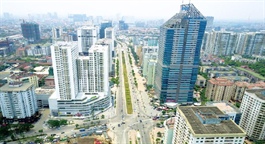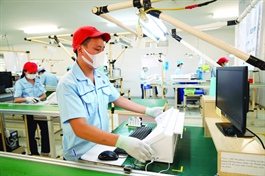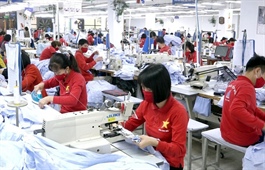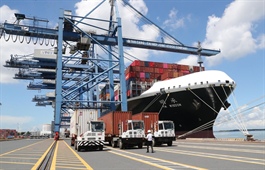Vietnam’s businesses urged to stay active in FTA utilization
Vietnam’s businesses urged to stay active in FTA utilization
These FTAs have laid the foundation for local businesses to expand their markets and further integrate into the global value chains.
The vast network of free trade agreements (FTAs) that Vietnam is a part of has been creating a favorable environment for local businesses to access the global market. However, an active approach to utilizing these deals would be essential for them to truly benefit in long the long run.
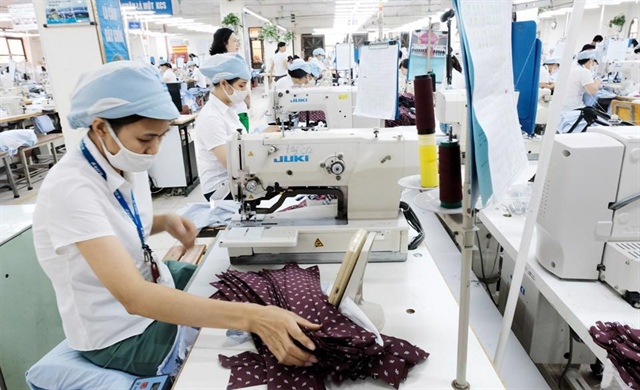
Production at Garment 10 Company. Photo: Pham Hung |
According to the Deputy Director General of the Vietnam Trade Promotion Agency under the Ministry of Industry and Trade Le Hoang Tai, the Vietnamese economy with a high level of openness has formed trading partnerships with 230 countries and territories, of which 60 are sharing FTAs with Vietnam.
“These FTAs have laid the foundation for local businesses to expand their markets and further integrate into the global value chains,” said Tai, referring to the US, EU, China, ASEAN, Japan, or South Korea, the major export markets which share FTAs with Vietnam.
During the 10 years of implementing Vietnam’s trade strategy for the 2011-2020 period, the country’s trade turnover rose by 2.7-fold from US$203.6 billion in 2011 to $545.3 billion by 2020.
Last year, Vietnam posted a record trade revenue of $668.5 billion, and around $371.2 billion during the first six months of 2022, representing an increase of 16.4% year-on-year.
Tai however, acknowledged existing shortcomings in Vietnam’s trade performance.
“Despite rising trade revenue, the majority of Vietnamese companies have not fully integrated into the value chains and currently engage in processing/assembling products with low-added value,” Tai said, pointing out the fact that foreign-invested companies currently account for 70% of Vietnam’s total export value.
From the business perspective, General Secretary of the Vietnam Leather and Footwear Association (Lefaso) Phan Thi Thanh Xuan said advantages from the FTAs have helped the leather industry overcome challenges from the Covid-19 pandemic.
Xuan said Vietnam’s footwear industry currently stands second worldwide behind China in terms of export turnover, and third in production capacity (after China and India).
In the first six months of 2022, Vietnam continued to maintain high footwear export growth to FTA markets, with shipments to CPTPP members up 10% and shipments to the EU rising 18%, Xuan added.
For long-term growth, however, Xuan expected the local companies to avoid over-dependence on the imported input materials, which are costing the industry billions of dollars every year due to strict environmental requirements.
“This is a major hindrance for Vietnamese products to penetrate markets, as they are struggling to meet rules of origin to qualify for preferential treatments under FTAs,” Xuan said.
Facing a similar situation, Spokesperson of the Vietnam National Textile and Garment Group (Vinatex) Vuong Duc Anh said the lack of local suppliers for input materials has made it difficult for textile companies to gain greater export turnover, especially from the EU.
Anh pointed out the fact that nearly 90% of the input materials for the industry are currently being imported from countries that are not members of the EU, or those which the bloc has signed trade deals with.
This implies the need for Vietnam to develop its textile manufacturing industry to take full advantage of the EU-Vietnam Free Trade Agreement (EVFTA), Anh said.
Pushing for long-term gains
Tai from the Vietnam Trade Promotion Agency expected exports to remain a highlight of the economy in the post-pandemic period, as well as providing an opportunity for Vietnamese businesses to further integrate into the global value chain.
“Next-generation FTAs would open up new preferential treatment in terms of tariff, and help the country attract foreign investors to expand domestic production capacity,” Tai said.
Local businesses could benefit tremendously from such a process, he continued.
Tai however, warned of rising competition pressure from FTAs, which would force local businesses to step up efforts to meet higher standards or risk losing out at home.
“Issues such as rising technical specification, intellectual property rights, or high standard of the working environment may cause higher operational expenses for businesses,” Tai said.
Economist Le Quoc Phuong called for the Government to provide more incentives for businesses to push for higher added value via a focus on rising localization rate and adopting modern technologies in the production process.
“A favorable business environment with simplified administrative procedures and lower compliance costs are essential to creating a competitive edge for local businesses,” he said.
Meanwhile, Phong called for businesses to stay active in searching for regulations and market preferences to avoid legal disputes.
“Local traders would need a detailed export plan that should be tailor-made for each market to ensure sustainability in the long term,” he said.







